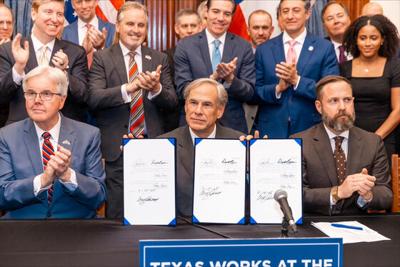(The Center Square) – Gov. Greg Abbott on Wednesday signed three pro-growth, business-friendly bills into law, with the goal of boosting Texas' capital market environment and solidifying Texas as the best state for business in the country, a ranking it consistently holds.
"Texas is the reigning and undisputed champion for doing business in the United States of America," Abbott said at the bill signing at the Texas Capitol. “There’s a difference between becoming a champion and repeating as national champion year after year. To remain at the highest level requires constant innovation and improvement, and that is what we constantly work on to keep Texas the number one business climate.”
He was joined by Lt. Gov. Dan Patrick, House Speaker Dustin Burrows, TXSE Group Inc. Founder, Chairman and CEO James Lee, and multiple state lawmakers.
Abbott first signed SB 29 into law, filed by Republican state Sen. Bryan Hughes and state Rep. Morgan Meyer. It codifies the business judgment rule, reforms derivative claims processes and creates a mechanism to pre-assess corporate director independence.
“It provides business decision makers the certainty that sound business judgments made in the best interest of shareholders will not be second-guessed by courts. Absent acts of violent crime, business decisions are to be made by the elected officers and shareholders, not by unelected judges,” Abbott said. “It also eliminates rogue shareholders with just a handful of shares of stock in a company from being able to hold a company hostage from the ability to make sound business decisions.”
He also signed into law SB 1058 filed by Republican state Sen. Tan Parker and state Rep. Giovanni Capriglione to “cement Texas as a premier location for stock exchanges.” It creates a franchise tax exemption for stock exchanges operating in Texas for certain tax liabilities.
He also signed into law House Joint Resolution 4, filed by Meyer and Parker, creating a constitutional ban on a stock exchange transactions tax and occupation tax. The resolution would be added to the ballot in November for voters to approve or reject as a constitutional amendment.
The resolution was a result of “our collective disdain in Texas for any type of tax,” Abbott said. “We dislike [taxes] so much that we made the income tax unconstitutional. We made a wealth tax unconstitutional. We made a real estate transaction tax unconstitutional. This session, we are making a capital gains tax unconstitutional.”
He’s referring to previous joint resolutions that put tax bans on the ballot as constitutional amendments, which voters overwhelmingly approved.
“To help you understand the real-world application of what that means in effect, in the lifetime of everybody in this room, there's never going to be any of those taxes in the state of Texas because it would require two-thirds vote [in the Texas legislature] to get it passed,” Abbott said, referring to amending the state constitution. “That's not happening in the lifetime of anybody here.”
HJR 4 also protects retirement accounts from transactions taxes, Abbott said.
“Texas has long been known as the best state for doing business,” he said, but with the new laws going into effect, Texas is “fast becoming the best state in America for stock exchange.”
Abbott and Lee first announced last October the newly formed Texas Stock Exchange (TXSE) as an alternative to the New York Stock Exchange and Nasdaq. Lee pointed to Texas providing an alternative to greater regulatory burdens in New York, including those related to Diversity, Equity and Inclusion, The Center Square reported. The Texas Stock Exchange would become a new hub for capital markets and bring more business to Texas, Abbott and Lee argued.
Four months later, in February, the New York Stock Exchange, part of Intercontinental Exchange, Inc. (NYSE: ICE), announced plans to launch NYSE Texas, a fully electronic equities exchange to be headquartered in Dallas, The Center Square reported. NYSE: ICE announced it was reincorporating NYSE Chicago in Texas and renaming NYSE Chicago as NYSE Texas, pending regulatory approval.
Fast forward three months and the Texas legislature passed bills that “will incentivize even more businesses to move their registrations, perhaps move their listings, and ultimately to move their headquarters to Texas,” Lee said.
The legislative package also “lays the foundation for exchange operators to make meaningful investments in the state of Texas while providing greater access to our public markets” and cements Texas “as the capital markets leader for generations,” he said.
“Thanks to the dedication of our state leadership and legislators, Texas will now be the No. 1 choice for corporate registrations and relocations, as well as the premier destination for securities listings. Our state is truly becoming the center of gravity for American capitalism."









